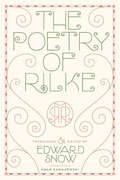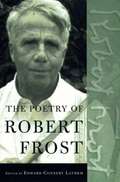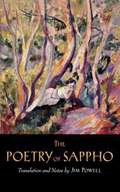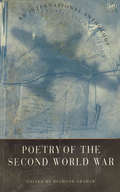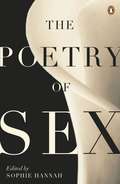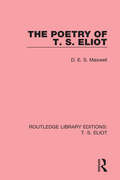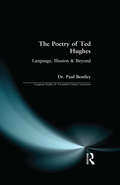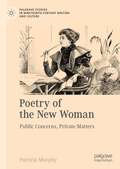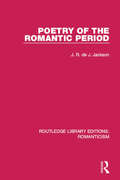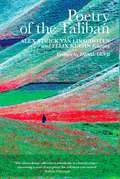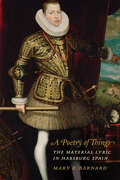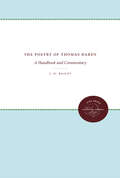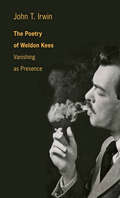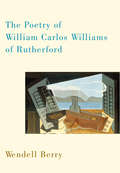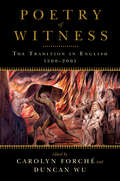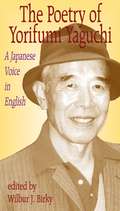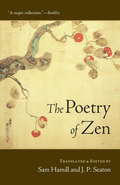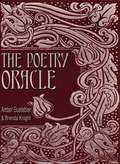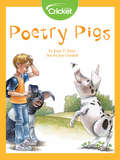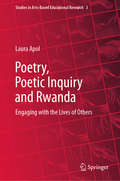- Table View
- List View
The Poetry of Rilke
by Edward Snow Rainer Maria Rilke Adam ZagajewskiFor the past twenty-five years, North Point Press has been working with Edward Snow, "Rilke's best contemporary translator" (Brian Phillips, The New Republic), to bring into English Rilke's major poetic works. The Poetry of Rilke--the single most comprehensive volume of Rilke's German poetry ever to be published in English--is the culmination of this effort. With more than two hundred and fifty selected poems by Rilke, including complete translations of the Sonnets to Orpheus and the Duino Elegies, The Poetry of Rilke spans the arc of Rilke's work, from the breakthrough poems of The Book of Hours to the visionary masterpieces written only weeks before his death. This landmark bilingual edition also contains all of Snow's commentaries on Rilke, as well as an important new introduction by the award-winning poet Adam Zagajewski. The Poetry of Rilke will stand as the authoritative single-volume translation of Rilke into English for years to come.
The Poetry of Robert Frost
by Robert FrostA feast for lovers of American literature--the work of our greatest poet, redesigned and relaunched for a new generation of readers. No poet is more emblematically American than Robert Frost.
The Poetry of Sappho
by SapphoFragments of the poetry of Sappho, Greek poetess who live in 7th century b.c. translated by Jim Powell. Book also includes a brief section on Sappho's life, Notes and and some references
Poetry Of The Second World War
by Desmond GrahamPoetry of the Second World War brings to light a neglected chapter in world literature. In its chorus of haunting poetic voices, over a hundred of the most articulate minds of their generation record the true experience of the 1939-45 conflict, and its unending consequences. In keeping with its subject, it has an international scope, with poems from over twenty countries, including Japan, Australia, Europe, America and Russia; poems in which human responses echo each other across boundaries of culture and state. Auden, Brecht, Stevie Smith, Primo Levi, Zbigniew Herbert and Anna Akhmatova are set alongside the eloquence of unknown poets. The anthology has been arranged to bring out the chronological and cumulative human experience of the war: pre-war fears, air raids, the boredom, fear and camaraderie of military life; battle, occupation and resistance; surviving and the aftermath. Here at last, are the poems of the Holocaust, the Blitz, Hiroshima; of soldiers, refugees and disrupted lives. What emerges is a poetry capable of conveying the vast and terrible sweep of war.
The Poetry of Sex
by Sophie HannahThe Poetry of Sex - a raucous, highly enjoyable anthology by acclaimed poet Sophie Hannah 'We've been at it all summer, from the Canadian border to the edge of Mexico . . .'It's hard to imagine a more fruitful subject for poets than sex, in all its glorious manifestations: from desire and hope, through disappointment and confusion, to conclusion and consequence. And little has changed over the centuries, as Sophie Hannah's anthology vividly demonstrates, from Catullus pleading with Lesbos to Walt Whitman singing the body electric. Moods and attitudes may vary but the drive persists as does the desire to write about it.Sophie Hannah's selection ranges from ancient Rome to modern New York, from gay to straight, but her principle has been to go low on the sugar and high on the excitement. It is essential reading for poetry lovers and romantics everywhere. Sophie Hannah has published five collections of poetry. Her fifth Pessimism for Beginners was shortlisted for the T.S. Eliot Award in 2007. Her Selected Poems is published by Penguin (revised edition, 2013). She is also the writer of bestselling psychological crime fiction, most recently The Carrier. Her novels have been translated into 24 languages. Born in Manchester, she now lives in Cambridge with her husband and children, and is a Fellow Commoner of Lucy Cavendish College.
The Poetry of Susan Howe: History, Theology, Authority (Modern and Contemporary Poetry and Poetics)
by Will MontgomeryThe Poetry of Susan Howe provides a comprehensive survey of the major works of one of America's foremost contemporary poets. The book describes the relationship between poetic form and the various configurations of history, religious thought, and authority in Howe's writing. Will Montgomery argues that her highly opaque texts reflect the resistance that the past offers to contemporary investigation. Addressing lyric, literary history, collage and visual poetics, The Poetry of Susan Howe is a lucid and persuasive investigation of the volatile movements of this extraordinary body of work.
The Poetry of T. S. Eliot (Routledge Library Editions: T. S. Eliot #6)
by D. E. MaxwellIn this fascinating and revealing book, first published in 1952, Maxwell shows the development of Eliot’s poetry and poetic thought in the light of his political and religious attachments. This study traces Eliot’s style from the earliest poems to the Quartets, and examines the characteristics of Eliot’s earlier work adumbrate that of his maturity. The Poetry of T. S. Eliot is essential reading for students of literature.
The Poetry of Ted Hughes: Language, Illusion & Beyond (Longman Studies In Twentieth Century Literature)
by Paul BentleyThis text provides a lucid and accessible introduction to the poetry of Ted Hughes, a major figure in twentieth- century poetry whose work is concerned with the forces of nature and their interaction with the human mind. It is also the first full length study to place Hughes's poetry in the context of significant developments in literary theory that have occured during his life, drawing in particular on the 'French theorists'- Jacques Lacan, Julia Kristeva, and Roland Barthes. The study sheds new light on Hughes's prosody, and on such matters as Hughes's relation to the 'Movement' poets, the influence of Sylvia Plath, his relation to Romanticism, his interest in myth and shamanism, and the implications of the Laureateship for his work. The poems are presented in chronological order, tracing the development of Hughes's highly distinctive style. The study also discusses Hughes's recently published non-fiction- Winter Pollen (1994) and Shakespeare and the Goddess of Complete Being (1992). The Poetry of Ted Hughes is indispensable for all students and academics interested in contemporary poetry and culture.
The Poetry of the First World War
by Santanu DasThe poetry of the First World War remains a singularly popular and powerful body of work. This Companion brings together leading scholars in the field to re-examine First World War poetry in English at the start of the centennial commemoration of the war. It offers historical and critical contexts, fresh readings of the important soldier-poets, and investigations of the war poetry of women and civilians, Georgians and Anglo-American modernists and of poetry from England, Ireland, Scotland, Wales and the former British colonies. The volume explores the range and diversity of this body of work, its rich afterlife and the expanding horizons and reconfiguration of the term 'First World War Poetry'. Complete with a detailed chronology and guide to further reading, the Companion concludes with a conversation with three poets - Michael Longley, Andrew Motion and Jon Stallworthy - about why and how the war and its poetry continue to resonate with us.
Poetry of the New Woman: Public Concerns, Private Matters (Palgrave Studies in Nineteenth-Century Writing and Culture)
by Patricia MurphyThe New Woman sought vast improvements in Victorian culture that would enlarge educational, professional, and domestic opportunities. Although New Women resist ready classification or appraisal as a monolithic body, they tended to share many of the same beliefs and objectives aimed at improving female conditions. While novels about the iconoclastic New Woman have garnered much interest in recent decades, poetry from the cultural and literary figure has received considerably less attention. Yet the very issues that propelled New Woman fiction are integral to the poetry of the fin de siècle. This book – the first in-depth account on the subject – enriches our knowledge of exceptionally gifted writers, including Mathilde Blind, M. E. Coleridge, Olive Custance, and Edith Nesbit. It focuses on their long-neglected British verse, analyzing its treatment of crucial matters on both the personal and public level to provide the attention the poetry so richly deserves.
Poetry of the Romantic Period (Routledge Library Editions: Romanticism #18)
by J. R. JacksonFirst published in 1980. This title provides a critical and historical account of poetry written between 1780 and 1835. The author has been especially concerned to place the great poems and poets of the age in the context of the conventions and traditions in which they wrote, offering new perspectives on familiar works. Poems still famous are examined often in relation to works of a similar kind fashionable at the time but now neglected, and these unconventional groupings throw fresh light on Romantic poetry as a whole. An appendix is included, designed to be read as a supplement to the main text, serving both as a chronology and as a brief guide to works that do not fall within the scope of the main argument. This title will be of interest to students of literature.
Poetry of the Taliban
by Hamid Stanikzai Mirwais RahmanyA rare encounter with the aesthetic achievements of one of the world's most notorious militant groups.
A Poetry of Things: The Material Lyric in Habsburg Spain (Toronto Iberic)
by Mary E. BarnardA Poetry of Things examines the works of four poets whose use of visual and material culture contributed to the remarkable artistic and literary production during the reign of Philip III (1598–1621). Francisco de Quevedo, Luis de Góngora, Juan de Arguijo, and Luisa de Carvajal y Mendoza cast cultural objects – ranging from books and tombstones to urban ruins, sculptures, and portraits – as participants in lively interactions with their readers and viewers across time and space. Mary E. Barnard argues that in their dialogic performance, these objects serve as sites of inquiry for exploring contemporary political, social, and religious issues, such as the preservation of humanist learning in an age of print, the collapse of empires and the rebirth of the city, and the visual culture of the Counter-Reformation. Her inspired readings explain how the performance of cultural objects, whether they remain in situ or are displayed in a library, museum, or convent, is the most compelling.
The Poetry of Thomas Hardy: A Handbook and Commentary
by J. O. BaileyThis handbook provides the background necessary for fully understanding the nearly one thousand poems of Hardy. As it treats the poems individually and often supplements the analysis of a poem by relating it to other poems and to passages in the fiction, every comment helps build a portrait of Hardy as a poet.Originally published in 1970.A UNC Press Enduring Edition -- UNC Press Enduring Editions use the latest in digital technology to make available again books from our distinguished backlist that were previously out of print. These editions are published unaltered from the original, and are presented in affordable paperback formats, bringing readers both historical and cultural value.
The Poetry of Victorian Scientists
by Daniel BrownA surprising number of Victorian scientists wrote poetry. Many came to science as children through such games as the spinning-top, soap-bubbles and mathematical puzzles, and this playfulness carried through to both their professional work and writing of lyrical and satirical verse. This is the first study of an oddly neglected body of work that offers a unique record of the nature and cultures of Victorian science. Such figures as the physicist James Clerk Maxwell toy with ideas of nonsense, as through their poetry they strive to delineate the boundaries of the new professional science and discover the nature of scientific creativity. Also considering Edward Lear, Daniel Brown finds the Victorian renaissances in research science and nonsense literature to be curiously interrelated. Whereas science and literature studies have mostly focused upon canonical literary figures, this original and important book conversely explores the uses literature was put to by eminent Victorian scientists.
The Poetry of Vision: Five Eighteenth-Century Poets
by Patricia Meyer SpacksThis study examines some of the poetry of James Thomson, William Collins, Thomas Gray, Christopher Smart and William Cowper -- five eighteenth-century poets of sensibility.
The Poetry of Weldon Kees: Vanishing as Presence
by John T. IrwinA study in how a poet’s corpus is remembered after he vanishes.Weldon Kees is one of those fascinating people of whom you’ve likely never heard. Most intriguingly, he disappeared without a trace on July 18, 1955. Police found his 1954 Plymouth Savoy abandoned on the north side of the Golden Gate Bridge one day later. The keys were still in the ignition. Though Kees had alluded days prior to picking up and moving to Mexico, none of his poetry, art, or criticism has since surfaced either north or south of the Rio Grande. Kees’s vanishing has led critics to compare him to another American modernist poet who met a similar end two decades prior—Hart Crane. In comparison to Crane, Kees is certainly now a more obscure figure. John T. Irwin, however, is not content to allow Kees to fall out of the twentieth-century literary canon. In The Poetry of Weldon Kees, Irwin ties together elements of biography and literary criticism, spurring renewed interest in Kees as both an individual and as a poet. Irwin acts the part of literary detective, following clues left behind by the poet to make sense of Kees’s fascination with death, disappearance, and the lasting interpretation of an artist’s work. Arguing that Kees’s apparent suicide was a carefully plotted final aesthetic act, Irwin uses the poet’s disappearance as a lens through which to detect and interpret the structures, motifs, and images throughout his poems—as the author intended. The first rigorous literary engagement with Weldon Kees’s poetry, this book is an astonishing reassessment of one of the twentieth century’s most gifted writers.
The Poetry of William Carlos Williams of Rutherford
by Wendell BerryAcclaimed essayist and poet Wendell Berry was born and has always lived in a "provincial" part of the country without an established literary culture. In an effort to adapt his poetry to his place of Henry County, Kentucky, Berry discovered an enduringly useful example in the work of William Carlos Williams. In Williams' commitment to his place of Rutherford, New Jersey, Berry found an inspiration that inevitably influenced the direction of his own writing.Both men would go on to establish themselves as respected American poets, and here Berry sets forth his understanding of that evolution for Williams, who in the course of his local membership and service, became a poet indispensable to us all.
Poetry of Witness: The Tradition in English, 1500-2001
by Carolyn Forché Duncan WuA groundbreaking anthology containing the work of poets who have witnessed war, imprisonment, torture, and slavery. A companion volume to Against Forgetting, Poetry of Witness is the first anthology to reveal a tradition that runs through English-language poetry. The 300 poems collected here were composed at an extreme of human endurance--while their authors awaited execution, endured imprisonment, fought on the battlefield, or labored on the brink of breakdown or death. All bear witness to historical events and the irresistibility of their impact. Alongside Shakespeare, Milton, and Wordsworth, this volume includes such writers as Anne Askew, tortured and executed for her religious beliefs during the reign of Henry VIII; Phillis Wheatley, abducted by slave traders; Samuel Bamford, present at the Peterloo Massacre in 1819; William Blake, who witnessed the Gordon Riots of 1780; and Samuel Menashe, survivor of the Battle of the Bulge. Poetry of Witness argues that such poets are a perennial feature of human history, and it presents the best of that tradition, proving that their work ranks alongside the greatest in the language.
Poetry of Yorifumi Yaguchi: A Japanese Voice In English
by Yorifumi YaguchiYorifumi Yaguchi is a nationally known poet in Japan. He was a child during World War II, watching while bombs split his countryside to pieces, while the neighbor girl fell prey to soldiers, while an American soldier crept into his home, hoping for rest and safety. Yaguchi's grandfather, a devout Buddhist priest, taught him peaceful ways, urged him to build a healed world. His father taught him the Shinto way, emperor-worship, and the nationalism that fueled Japan's World War II military efforts. The War focused Yaguchi's poetic abilities instead of destroying them, says Wilbur Birky, the editor of this volume of 150 of Yaguchi's poems in English. Six sections form this collection -- "Silence," "Child of War," "Horizon," "Breath of God,' "Words Made Flesh," and "War and Peace." The poems cover the span of Yaguchi's life -- and his career as a poetry professor and editor, as a Mennonite Christian pastor, and as a nationally recognized, still-practicing poet.
The Poetry of Zen
by Sam Hamill J. P. SeatonA Zen poem is nothing other than an expression of the enlightened mind, a handful of simple words that disappear beneath the moment of insight to which it bears witness. Poetry has been an essential aid to Zen Buddhist practice from the dawn of Zen--and Zen has also had a profound influence on the secular poetry of the countries in which it has flourished. Here, two of America's most renowned poets and translators provide an overview of Zen poetry from China and Japan in all its rich variety, from the earliest days to the twentieth century. Included are works by Lao Tzu, Han Shan, Li Po, Dogen Kigen, Saigyo, Basho, Chiao Jan, Yuan Mei, Ryokan, and many others. Hamill and Seaton provide illuminating introductions to the Chinese and Japanese sections that set the poets and their work in historical and philosophical context. Short biographies of the poets are also included.
The Poetry Oracle
by Brenda Knight Amber GuetebierCombining poetry with divination, this collection resurrects the ancient Greek art of Rhapsodomancy, or divining one's fortune or destiny through the use of poetry or verse. Harkening back to antiquity, when Polyhymnia--the muse of sacred poetry--and Calliope--the muse of epic poetry--were invoked for guidance, each page of this anthology contains three poetic excerpts, chosen for their oracular wisdom. Readers are asked to contemplate a question and then randomly select an excerpt, which will offer revelations and inspiration for further contemplation. Excerpts are drawn from poets throughout the ages, including Sappho, Li Po, Rumi, Emily Dickinson, Walt Whitman, Dylan Thomas, William Blake, and J.R.R. Tolkien. Though designed as a prophetic tool, it can also be used as an introduction to some of the world's greatest poets.
Poetry, Physics, and Painting in Twentieth-Century Spain
by Candelas GalaThis book reads the work of Salinas, Guill#65533;n, Larrea, Diego, Alberti, M#65533;ndez, and Lorca in analogical relation with Cubism and with the revolutionary discoveries of modern physics. Gala advances traditional criticism by considering these artists in the broader cultural context of Spain, Europe, and European Modernism.
Poetry Pigs
by Joan T. ZeierHow could George write a poem? He wasn't a poet. But then George touches down in the Land of Hogs: Poetry Pig Farm! Pigs William Shakespeare and Emily Dickinson help George learn to become a poet.
Poetry, Poetic Inquiry and Rwanda: Engaging with the Lives of Others (Studies in Arts-Based Educational Research #3)
by Laura ApolThis book describes the practice of poetic inquiry and takes the reader through the process of translating lived experience into poetry that attends to the lives of others. Using her own writing—from early drafts to published poems—Apol demonstrates elements of poetic inquiry that both give it strength and make it complicated: the importance of craft (the aesthetic); the imperative of accuracy and reliability (the investigative); the significance of ethical responsibility that leads to action (witness); and the centrality of relational connectedness and accountability (withness). Apol raises questions about what it means for poems to function as both research and art, and illustrates what happens when there are irresolvable conflicts between the demands of the poem and a commitment to relationship. Throughout, Apol addresses her white privilege, as well as the dominant white/colonial narrative that often seeps into arts-based work unless it is overtly and critically addressed. The book goes beyond arts-based research, speaking as well to other forms of cross-national, cross-cultural research. It is a call for relational scholarship that moves toward action, a heart-rending teaching, a post-traumatic aesthetic map laid down with clear and poignant theory and praxis to extend, serve and guide.
